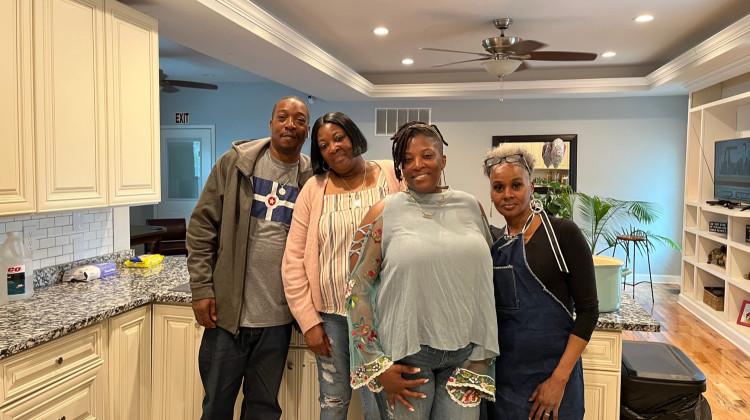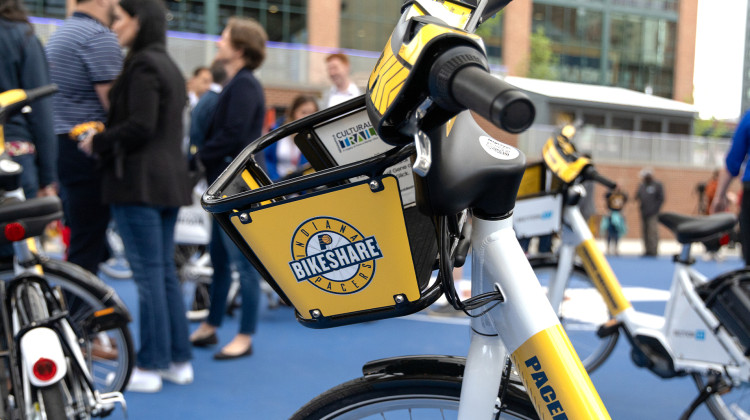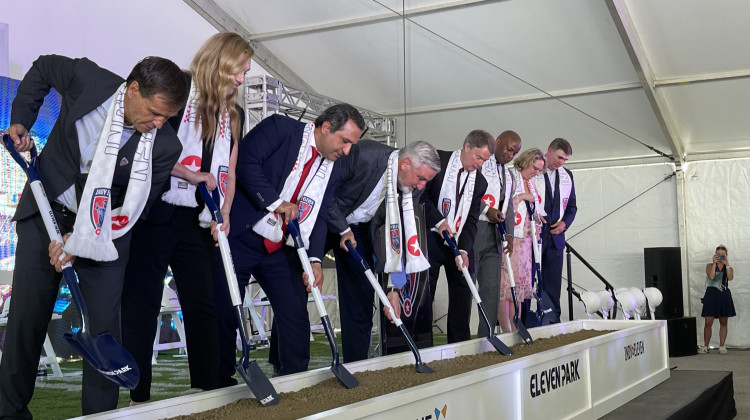
Regina Allen (second from left) with some of her family and staff at the home in Fall Creek Place.
Jill Sheridan WFYIMaryAnn Quinton doesn’t know if she will have to find another place to live. Right now she lives in a supportive group home in Fall Creek Place – where she is able to manage her severe depression.
“And know that I'm safe, know that everything's okay, know that these people don't judge me,” Quinton said. “We're just trying to manage our lives, and these people help us.”
The rehabbed group home is run by Regina Allen. She operates several properties in Indianapolis through her nonprofit Project Safe Haven. Her clients have difficulty living independently because of various mental health issues, and many are referred to her by hospitals, domestic shelters and prisons.
“We take care of them, we do everything for people. At the end of the day, they have mental health issues,” Allen said, “And they don't have no control over the way they be. But we have control. We give them their medicine. We make sure they eat. We make sure they got a roof over our head. They are not running around in the streets.”
Some residents were distributive in the neighborhood, when she first moved into the house near the beginning of the pandemic. She had to move people there quickly because one of her other homes burned down. She quickly transferred them when there were problems.
Allen said since then there haven't been any disruptions.
Indianapolis needs more supportive housing like the type that Project Safe Haven offers. Allen receives a constant stream of requests for beds. So, after the disruptive residents moved out, she took in eight more people – the house is large enough – and submitted a zoning variance request.
But some neighbors remembered the earlier disturbances. They testified that those early residents were outside loitering, disturbing the peace, urinating in public and littering.
The zoning board denied Allen’s request. It decided to stay within the state code that limits group homes to eight people, even though the house can accommodate more.
Allen said the neighbors don’t understand they’re curbing a needed service.
“They just trying to judge us and make us look like we are really bad. I've been doing this for 13 years, taking care of people. So you have no idea. No idea what we do for them people,” Allen said.
It’s hard to estimate how many similar supportive housing units the city has. Recovery housing does need to be certified, and in 2017 CHIP counted 13 such housing organizations in Indianapolis, including Allens. But many other supportive homes are private boarding home residences. And while group homes are regulated through the state, boarding homes are not tracked.
Allen helps about 50 people in her homes, across Indianapolis. Residents pay $550 a month, and that includes utilities, meals, transportation and health support.
Her non-profit is representative of one of many different types of supportive housing stock. Some are transitional units where residents can find housing stability after homelessness.
But many neighbors fear residents in all types of supportive housing. Allen’s zoning board denial is just one example.
Allen’s Lawyer Russel Sipes says the rulings should be based on need, not judgment. But he also said people have a right to speak their mind.
“You can't and shouldn't stop people from raising concerns before the zoning Commission,” Sipes said.
He also said the zoning policy needs to be updated. He said the ordinance is too narrow to apply to housing projects like Project Safe Haven.
“Those entities only operate within the ordinance they've got, and the ordinance I think is the problem here,” he said. “There are provisions for transitional housing, there are provisions for group homes and there are provisions for boarding homes, and none of those fit squarely what's really happening with facilities like this one,” Sipes said.
WFYI asked the city for comment. Mathew Pleasant a planner from the City said the code is flexible, and they pointed out that people can ask the board to make exceptions. There is also free, online training to help petitioners present their cases – for example, the city recommends petitioners engage and educate neighbors before the zoning hearing.
And some do.
Executive Director of Overdose Lifeline Justin Phillips underwent a rezone the same month Allen lost her bid to take more residents in at the home in Fall Creek. But Phillips won her request.
The zoning commission granted her a rezone to open a recovery home in Meridian Kessler, though that rezone also still faced neighbor opposition.
Neighbors protested the recovery housing at the zoning hearing and said residents would have a hard time resisting the temptation of local bars. And some said medication-assisted treatment in the home would attract crime. Phillips said that judgment worries her.
“All this stigma and judgment and misinformation,” Phillips said, “the concern that I have for these women, that we're going to bring it to the home, and how they will be treated when they walk outside and step onto the sidewalk.”
Unlike some other petitioners, Phillips was ready to navigate the policy hurdles. She is also well known by many policy leaders – her non-profit Overdose Lifeline leads statewide efforts to reduce stigma and harm. She anticipated challenges, and the city gave her funding as well.
Phillips said more people need rezone approvals, so more people can have safe beds in supportive housing. She said local health and service providers tell her that.
“[They say] ‘women are dying on the waiting list Justin,’ and that there are just not any beds, we need this house. It’s absolutely true,” Phillips said.
Phillips stressed, whether it’s addiction recovery or wrap around services, the supportive piece is key. It’s not just a place to sleep.
“Because we know real recovery requires community and belonging and having people surround you who understand where you're coming from and who have a shared experience,” she said.
In Fall Creek Place, the city cited Allen for having 16 residents without approval. She did not want to ask half of them to go, because they have nowhere to go, so she has requested a new hearing.
Contact WFYI city government and policy reporter Jill Sheridan at jsheridan@wfyi.org. Follow on Twitter: @JillASheridan.
 DONATE
DONATE








 View More Programs
View More Programs

 Support WFYI. We can't do it without you.
Support WFYI. We can't do it without you.